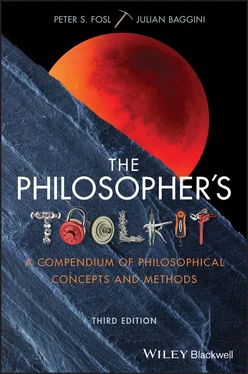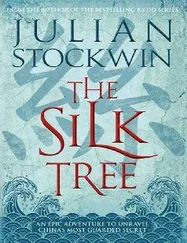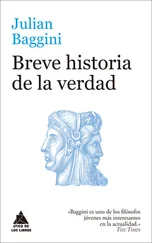1 Cover
2 Acknowledgements
3 Alphabetical Table of Contents
4 Preface
5 1 Basic Tools for Argument 1 Basic Tools for Argument 1 1.1 Arguments, premises, and conclusions 2 1.2 Deduction 3 1.3 Induction 4 1.4 Validity and soundness 5 1.5 Invalidity 6 1.6 Consistency 7 1.7 Fallacies 8 1.8 Refutation 9 1.9 Axioms 10 1.10 Definitions 11 1.11 Certainty and probability 12 1.12 Tautologies, self‐contradictions, and the law of non‐contradiction
1.1 Arguments, premises, and conclusions 1.1 Arguments, premises, and conclusions Philosophy is for nit‐pickers. That’s not to say it is a trivial pursuit. Far from it. Philosophy addresses some of the most important questions human beings ask themselves. The reason philosophers are nit‐pickers is that they are commonly concerned with the ways in which the claims and beliefs people hold about the world either are or are not rationally supported, usually by rational argument. Because their concern is serious, it is important for philosophers to demand attention to detail. People reason in a variety of ways using a number of techniques, some legitimate and some not. Often one can discern the difference between good and bad reasoning only if one scrutinises the content and structure of arguments with supreme and uncompromising diligence.
1.2 Deduction 1.3 Induction 1.4 Validity and soundness 1.5 Invalidity 1.6 Consistency 1.7 Fallacies 1.8 Refutation 1.9 Axioms 1.10 Definitions 1.11 Certainty and probability 1.12 Tautologies, self‐contradictions, and the law of non‐contradiction
6 2 More Advanced Tools 2.1 Abduction 2.2 Hypothetico‐deductive method 2.3 Dialectic 2.4 Analogies 2.5 Anomalies and exceptions that prove the rule 2.6 Intuition pumps 2.7 Logical constructions 2.8 Performativity and speech acts 2.9 Reduction 2.10 Representation 2.11 Thought experiments 2.12 Useful fictions
7 3 Tools for Assessment 3.1 Affirming, denying, and conditionals 3.2 Alternative explanations 3.3 Ambiguity and vagueness 3.4 Bivalence and the excluded middle 3.5 Category mistakes 3.6 Ceteris paribus 3.7 Circularity 3.8 Composition and division 3.9 Conceptual incoherence 3.10 Contradiction/contrariety 3.11 Conversion, contraposition, obversion 3.12 Counterexamples 3.13 Criteria 3.14 Doxa/para‐doxa 3.15 Error theory 3.16 False dichotomy 3.17 False cause 3.18 Genetic fallacy 3.19 Horned dilemmas 3.20 Is/ought gap 3.21 Masked man fallacy 3.22 Partners in guilt 3.23 Principle of charity 3.24 Question‐begging 3.25 Reductios 3.26 Redundancy 3.27 Regresses 3.28 Saving the phenomena 3.29 Self‐defeating arguments 3.30 Sufficient reason 3.31 Testability
8 4 Tools for Conceptual Distinctions 4.1 A priori/a posteriori 4.2 Absolute/relative 4.3 Analytic/synthetic 4.4 Belief/knowledge 4.5 Categorical/modal 4.6 Cause/reason 4.7 Conditional/biconditional 4.8 De re/de dicto 4.9 Defeasible/indefeasible 4.10 Entailment/implication 4.11 Endurantism/perdurantism 4.12 Essence/accident 4.13 Internalism/externalism 4.14 Knowledge by acquaintance/description 4.15 Mind/body 4.16 Necessary/contingent 4.17 Necessary/sufficient 4.18 Nothingness/being 4.19 Objective/subjective 4.20 Realist/non‐realist 4.21 Sense/reference 4.22 Substratum/bundle 4.23 Syntax/semantics 4.24 Universal/particular 4.25 Thick/thin concepts 4.26 Types/tokens
9 5 Tools of Historical Schools and Philosophers 5.1 Aphorism, fragment, remark 5.2 Categories and specific differences 5.3 Elenchus and aporia 5.4 Hegel’s master/slave dialectic 5.5 Hume’s fork 5.6 Indirect discourse 5.7 Leibniz’s law of identity 5.8 Ockham’s razor 5.9 Phenomenological method(s) 5.10 Signs and signifiers 5.11 Transcendental argument
10 6 Tools for Radical Critique 6.1 Class critique 6.2 Différance, deconstruction, and the critique of presence 6.3 Empiricist critique of metaphysics 6.4 Feminist and gender critiques 6.5 Foucaultian critique of power 6.6 Heideggerian critique of metaphysics 6.7 Lacanian critique 6.8 Critiques of naturalism 6.9 Nietzschean critique of Christian–Platonic culture 6.10 Pragmatist critique 6.11 Sartrean critique of ‘bad faith’
11 7 Tools at the Limit 7.1 Basic beliefs 7.2 Gödel and incompleteness 7.3 Hermeneutic circle 7.4 Philosophy and/as art 7.5 Mystical experience and revelation 7.6 Paradoxes 7.7 Possibility and impossibility 7.8 Primitives 7.9 Self‐evident truths 7.10 Scepticism 7.11 Underdetermination and incommensurability
12 Index
13 End User License Agreement
1 Cover
2 Table of Contents
3 Begin Reading
1 iii
2 iv
3 v
4 vi
5 vii
6 xiii
7 xv
8 xvi
9 xvii
10 xviii
11 xix
12 xx
13 1
14 2
15 3
16 4
17 5
18 6
19 7
20 8
21 9
22 10
23 11
24 12
25 13
26 14
27 15
28 16
29 17
30 18
31 19
32 20
33 21
34 22
35 23
36 24
37 25
38 26
39 27
40 28
41 29
42 30
43 31
44 32
45 33
46 34
47 35
48 36
49 37
50 38
51 39
52 40
53 41
54 42
55 43
56 44
57 45
58 47
59 48
60 49
61 50
62 51
63 52
64 53
65 54
66 55
67 56
68 57
69 58
70 59
71 60
72 61
73 62
74 63
75 64
76 65
77 66
78 67
79 68
80 69
81 70
82 71
83 72
84 73
85 74
86 75
87 76
88 77
89 78
90 79
91 80
92 81
93 82
94 83
95 84
96 85
97 86
98 87
99 88
100 89
101 90
102 91
103 92
104 93
105 94
106 95
107 96
108 97
109 98
110 99
111 100
112 101
113 102
114 103
115 104
116 105
117 106
118 107
119 108
120 109
121 110
122 111
123 112
124 113
125 114
126 115
127 116
128 117
129 118
130 119
131 120
132 121
133 122
134 123
135 124
136 125
137 126
138 127
139 128
140 129
141 130
142 131
143 132
144 133
145 134
146 135
147 136
148 137
149 138
150 139
151 140
152 141
153 142
154 143
155 144
156 145
157 146
158 147
159 148
160 149
161 150
162 151
163 152
164 153
165 154
166 155
167 156
168 157
169 158
170 159
171 160
172 161
173 162
174 163
175 164
176 165
177 166
178 167
179 168
180 169
181 170
182 171
183 172
184 173
185 174
186 175
187 176
188 177
189 178
190 179
191 180
192 181
193 182
194 183
195 184
196 185
197 186
198 187
199 188
200 189
201 190
202 191
203 192
204 193
205 194
206 195
207 196
208 197
209 198
210 199
211 200
212 201
213 202
214 203
215 204
216 205
217 206
218 207
219 208
220 209
221 210
222 211
223 212
224 213
225 214
226 215
227 216
228 217
229 218
230 219
231 220
232 221
233 222
234 223
235 224
236 225
237 226
238 227
239 228
240 229
241 230
242 231
Читать дальше












